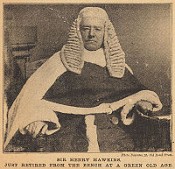Brampton Henry Hawkins Baron

Henry Hawkins, 1st Baron Brampton (14 September 1817 – 6 October 1907) was an English judge. Born at Hitchin, he was the son of a solicitor, and was early familiarized with legal principles. He received his education at Bedford School, and was called to the bar at the Middle Temple in 1843. He at once joined the old home circuit, and after enjoying a lucrative practice as a junior, became a barrister in 1859. His name is identified with many of the famous trials of the reign of Queen Victoria. He was engaged in the Simon Bernard case, in that of Roupell v. Waite, and in the Overend-Gurney prosecutions. The two causes célèbres, however, in which Hawkins attained his highest legal distinction were the Tichborne trials and the great will case of Sugden v. Lord St. Leonards. In both of these he won. He did a lucrative business in references and arbitrations, and acted for the royal commissioners in the purchase of the site for the new law courts. Election petitions also formed another branch of his extensive practice. Hawkins was raised to the bench in 1876, and was assigned to the then exchequer division of the High Court, not as baron (an appellation which was being abolished by the Judicature Act), but with the title of Sir Henry Hawkins. His knowledge of the criminal law was extensive and intimate and he got a reputation as a hanging judge. Hawkins would be the judge at a large number of the most famous English criminal trials of his day. His first major case was the 1877 trial of Louis Staunton and his brother Patrick, and two others for the murder of Louis' wife Harriet and her baby by starvation. A question regarding whether he was too favorable to the prosecution's case (coupled with the actual proof of death being starvation rather than meningitis) led to a public campaign orchestrated by the novelist Charles Reade. The decision reduced the sentences of the three convicted defendants (for the Staunton brothers prison sentences rather than death sentences). Patrick Staunton's barrister, Edward Clarke never forgave Hawkins, whom he considered a wicked judge, and refused years later to support any attempt of the British Bar to celebrate the man at his retirement. Other cases that Hawkins was judge in included that of Dr. George Henry Lamson for the poisoning of his brother-in-law Percy Johns at Wimbledon in December 1881 (the trial was in April 1882), the trial of Dr. Thomas Neill Cream for the Lambeth/Strepney poisonings of prostitutes from December 1891 to April 1892 (the trial was in November 1892), and the trial of Albert Milsom and Henry Fowler for the Muswell Hill murder in February 1896 (the trial was in May 1896). In 1898 he retired from the bench, and was raised to the peerage under the title of Baron Brampton. He frequently took part in determining House of Lords appeals. He held for many years the office of counsel to the Jockey Club, and as an active member of that body found relaxation from his legal and judicial duties at the leading race meetings, and was considered a capable judge of horses. In 1898 he converted to Catholicism, and in 1903 he presented, in conjunction with Lady Brampton (his second wife), the chapel of Sts. Augustine and Gregory to the Roman Catholic Westminster Cathedral, which was consecrated in that year. In 1904 he published his Reminiscences. He died in London on the 6th of October 1907, and Lady Brampton in the following year.
do you like this author?
What readers are saying
What do you think? Write your own comment on this book!
write a commentWhat readers are saying
What do you think? Write your own comment on this author!
write a commentBook list

The Reminiscences of Sir Henry Hawkins (Baron Brampton)
Series:
Unknown
Year:
Unknown
Raiting:
5/5
Show more
add to favoritesadd In favorites
Book list

The Reminiscences of Sir Henry Hawkins (Baron Brampton)
Series:
Unknown
Year:
Unknown
Raiting:
5/5
Show more
add to favoritesadd In favorites
What readers are saying
What do you think? Write your own comment on this author!
write a commentGenre
if you like Brampton Henry Hawkins Baron try:
readers also enjoyed
What readers are saying
What do you think? Write your own comment on this author!
write a commentGenre
if you like Brampton Henry Hawkins Baron try:
readers also enjoyed
Do you want to read a book that interests you? It’s EASY!
Create an account and send a request for reading to other users on the Webpage of the book!

